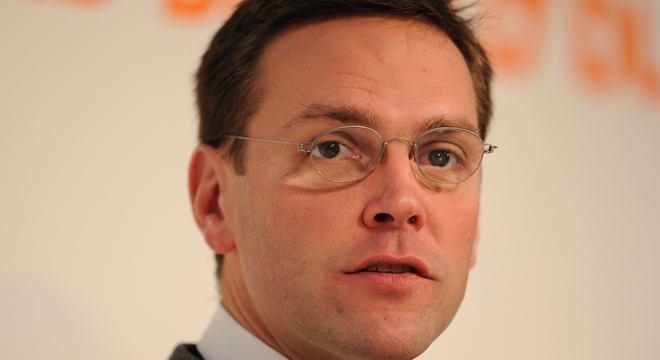As News Corp deputy CEO James Murdoch prepares to make his second appearance before Parliament on Thursday, here’s what you need to know about his testimony over the News Of The World phone hacking scandal.
The Culture, Media and Sport Committee announced in September that it would recall Murdoch over allegations that he misled the committee when he first testified with his father Rupert back in July. He is scheduled to appear early Thursday morning UK time.
The most damning allegations come from former NOTW legal manager Tom Crone and former editor Colin Myler, related to the time in 2008 when News Corp paid then-chief executive of the Professional Footballers’ Association Gordon Taylor a confidential six-figure out-of-court settlement. Taylor had sued NOTW for phone hackings that had taken place in 2005.
Crone and Myler allege that before the settlement was finalized, they informed James Murdoch of a 2005 document known as the “for Neville” e-mail that contained transcripts of 35 hacked phone messages from Taylor’s phone, and was identified as “the transcript for Neville.” The Guardian identified “Neville” as then-News Of The World reporter Neville Thurlbeck.
Up until that point, News International and Murdoch had claimed that the practice was limited to “rogue” reporter Clive Goodman and private investigator Glenn Mulcaire, who were both convicted of the phone hackings. Mulcaire himself reportedly hacked the phones of almost six thousand people, The Guardian reported last week.
And though in the past few months it’s become clear that the practice was far more widespread than NI executives had initially claimed — with a number of executives and reporters getting arrested in connection with the alleged hackings — Murdoch has claimed ignorance of the extent of the practice.
Murdoch was asked about the e-mail in his July 20th testimony before Parliament and whether he knew about it before he agreed to the settlement: “No, I was not aware of that at the time.”
In testimony before Parliament in September, Crone disputed Murdoch’s take on the sequence of events. “It was clear evidence that phone-hacking was taking place beyond Clive Goodman,” he said. “It was the reason that we had to settle the case. And in order to settle the case we had to explain the case to Mr. Murdoch and get his authority to settle.”
From the New York Times, a former law firm for News International has also said it warned executives that the practice of phone hacking was widespread within the company, and advised them to handle the case privately:
Recently released News of the World documents, some of them obtained by the parliamentary committee from News International’s former lawyers, Farrer & Company, show that on June 3, 2008, a lawyer warned company executives in a memo that there was “a powerful case that there is (or was) a culture of illegal information access” at the paper.
The lawyer, Michael Silverleaf, also said there was “overwhelming evidence of the involvement of a number of senior journalists” in the paper’s attempts to illegally obtain information about Gordon Taylor, the chief executive of the Professional Footballers’ Association.
The Committee is also planning to ask Murdoch about a severance package awarded to Rebekah Brooks, a former News International chief executive who was arrested in connection with the scandal, worth more than $2 million that included a car and driver.
This week The Guardian also reported that News Of The World hired private investigators to follow lawyers representing phone hacking victims, in order to pressure them to back off.
Derek Webb, a private investigator, said this week that he routinely surveilled over 100 people for NOTW after the phone hacking scandal first came to light, including Prince William, Daniel Radcliffe, David Beckham, Labour MP David Milliband, and other politicians, celebrities and athletes.









